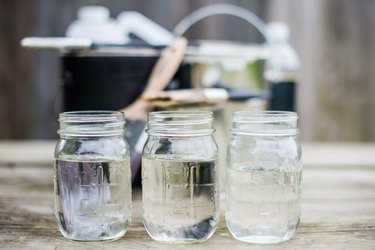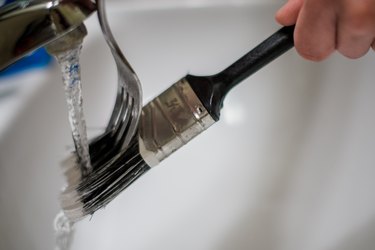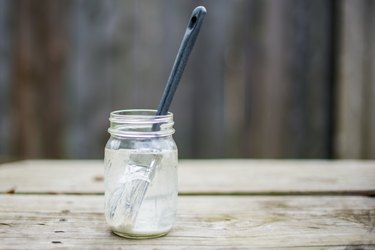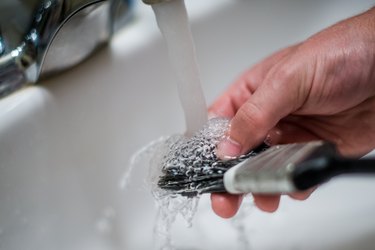
No matter how conscientious you are when cleaning a paintbrush, sometimes a little paint dries between the bristles, making the bristles stiff and difficult to move. Generally, soaking the brush in a solvent compatible with the original paint softens the brush and renders it useful once again. For a more natural solution without harsh chemicals, hot vinegar often does the trick.
Latex Paint Loosener
Video of the Day

If the paint causing the brush stiffness is latex-based, soak the brush in hot water or run the bristles under hot tap water, flexing the brush back and forth against your hand a bit to help loosen the paint's grip on the bristles. If you notice hardened paint clumping the bristles together, run a fork through the bristles to loosen the hard paint, then continue rinsing or soaking the brush. Wash the brush with warm soapy water afterwards, and rinse it again.
Video of the Day
Loosening Lacquer-Based Paint

If the brush was last used with a lacquer paint, soak it in lacquer thinner for 30 minutes or so, in a well-ventilated area. Swish the brush around in the lacquer thinner, then rinse the brush under warm water several times to remove all the lacquer thinner and remaining paint. Wash the brush in warm, soapy water and rinse it again until the brush is free from soap, paint and thinner.
Oil-Based Options

Turpentine or paint thinner helps soften paintbrushes affected by oil-based paint or stain. Either one of these solvents also works for hardening problems caused by varnish or enamel paint. After soaking the stiff brush for at least half an hour in a well-ventilated area, rinse the brush under hot water, then wash the bristles in warm, soapy water. Rinse it again to remove all foreign substances.
An Alternative Solution

White vinegar offers an alternative to harsh-smelling chemical-based solvents. Heat a cup or so of vinegar in a microwave-safe container, such as a glass measuring cup used for nonfood purposes, for a minute or until the outside of the container feels hot; exact times may vary based on the power of the microwave. Soak the stiff brush in the vinegar for 20 or 30 minutes, then wash it in soapy warm water. Rinse out the vinegar and paint residue.